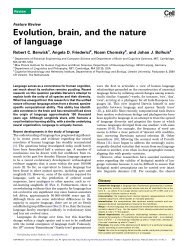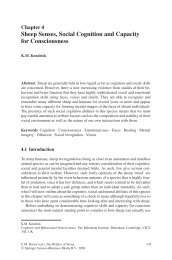Ulric Neisser
Ulric Neisser
Ulric Neisser
Create successful ePaper yourself
Turn your PDF publications into a flip-book with our unique Google optimized e-Paper software.
J.J. Gibson was simply not interested in the kind of experiments that dominated the pages<br />
of Cognitive Psychology - brief presentations of letter strings, for example. He insisted on using<br />
methods that were ecologically valid, so the perceptual systems could operate as they normally<br />
do. Having said similar things about memory myself from time to time, I found this point of<br />
view congenial. It took much longer to understand what he meant by saying that the visual<br />
system "picks up" information that is already "in the light" and need not be processed at all. Well<br />
yes, of course it was in the light: where else would it be? Slowly, I began to see that Gibson was<br />
right on this point too. But where did that leave me? Was there some way we could both be<br />
right? Could information be picked up and processed?<br />
Other aspects of the Gibsonian approach - the commitment to realism, the conception of<br />
perceivers as active seekers for information - were also attractive. I liked them much better than<br />
the mechanical chronometric models that had been inspired by Cognitive Psychology. What's<br />
more, the sixties were in the air. Some of the action was local: African-American students at<br />
Cornell made national news by arming themselves and actually taking over a University<br />
building. Like other faculty, I felt closely involved in what was clearly a crisis for the University.<br />
(The issues at Cornell were eventually compromised; no one was punished. I welcomed this<br />
outcome, though others viewed it with alarm.) Indeed, the whole country was in the throes of<br />
change. Somehow, quite irrationally, this radical atmosphere seemed to increase my interest in<br />
developing a new and more ecologically committed psychology.<br />
Cognition and Reality<br />
Soon I was lucky again: the Center for Advanced Study in the Behavioral Sciences in<br />
Palo Alto invited me to spend my sabbatical there in 1973-74. We (Arden and I; Eric, Jenny,<br />
Katherine, and Joe) went eagerly, renting a house for the year in Palo Alto. We had a good time<br />
there, as almost everyone does. I myself gave talks at various universities up and down the coast,<br />
talks that are no longer memorable except for one retrospectively hilarious moment at the<br />
University of California in San Diego. The faculty proudly showed me the latest technical<br />
advance: their computers were interconnected so they could send messages to each other! It was<br />
called "electronic mail." I didn't see any point to it, and told them I didn't think it would amount<br />
to much!<br />
Later that year, Lauren Resnick invited me to comment on the papers at a conference on<br />
"The Nature of Intelligence" that she was organizing in Pittsburgh. Some of the papers focused<br />
on artificial intelligence and others on human thinking, but it seemed to me that almost all were<br />
committed to an overly narrow conception of intelligence. To emphasize that narrowness, my<br />
commentary (<strong>Neisser</strong>, 1976) distinguished between "academic intelligence" and "general<br />
intelligence." I thought the distinction was rather obvious, but to my surprise it was later often<br />
cited as a significant theoretical advance.<br />
At the Center for the Behavioral Sciences, everyone has a primary project. What project<br />
should I undertake? One obvious possibility, which my publisher encouraged, was to prepare a<br />
revised edition of Cognitive Psychology. After six years this was a reasonable idea, so I tried to<br />
do it. Unfortunately, doing it meant reading the rapidly growing cognitive literature - a literature<br />
dominated by information-processing models and mental chronometry. My dislike of that<br />
literature grew apace, and a day came when I felt I couldn't read another reaction-time study to<br />
save my life. I threw my drafts away and set to work on a different book, to be called Cognition<br />
and Reality (1976). I started it at the Center, but needed two more years to finish it.<br />
11




